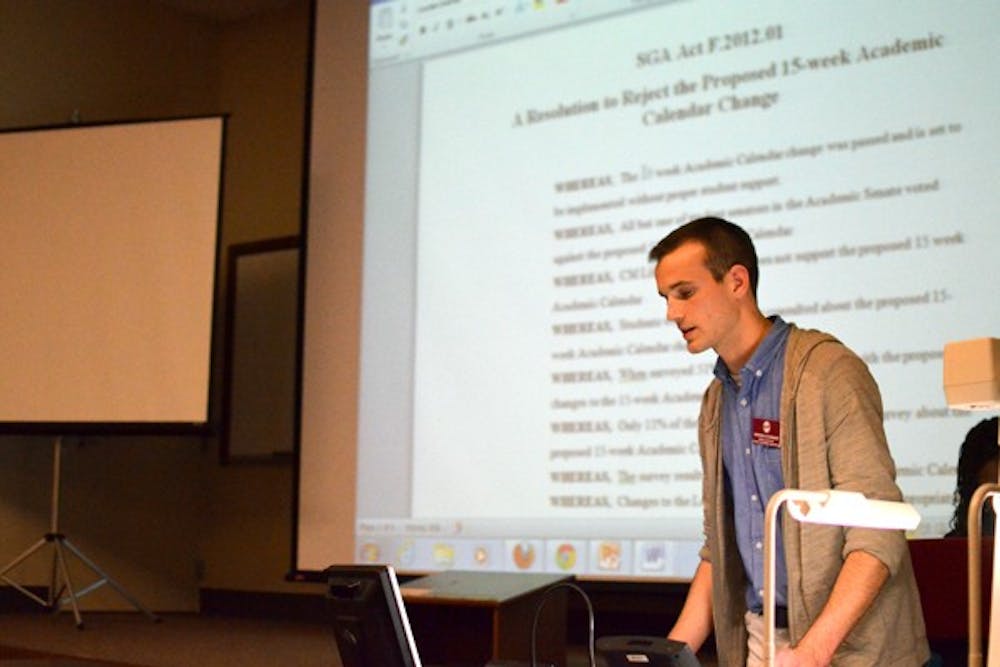SGA overwhelmingly approves legislation to oppose academic calendar changes

The Student Government House and Senate both oppose planned Academic Calendar changes that could be coming in the fall of 2014.
The SGA House voted unanimously to approve a motion Monday, declaring SGA officially opposes the planned academic calendar changes that were put in motion in the spring.
The SGA Senate also voted to oppose the academic calendar, with 15 for the motion and two against, with one abstaining.
"I think that Matt Serra and Laura Frey said it best when they met with us three weeks ago," SGA Vice President and Hesperia senior Killian Richeson said. "They stated that this would occur unless something insurmountable occurred. Something insurmountable has just occurred."
Under the change, the fall 2014 semester would begin on Sept. 2, after Labor Day, effectively eliminating one week of structured class time.
The motion, introduced by SGA senators Marie Reimers, a Saginaw sophomore; Muskegon junior Sara O’Toole and graduate student Binu Prabhakaran, along with Resident Hall Assembly spokesman and Bloomfield Hills senior Scott Cooke, lists 38 reasons why the academic calendar would be detrimental to the Central Michigan University student body.
The motion charged the change with not having enough student support, not being efficiently planned and being detrimental to the quality of academics at CMU.
SGA President and Macomb junior Justin Gawronski said he's confident the passed motion will prevent the planned changes from occurring, Academic Senate officials are unsure what effect this will have.
In an Oct. 10 CM Life article, A-Senate Chairman Jim McDonald said SGA does not have direct control over whether or not the academic calendar would be rescinded. Executive Director of Faculty Personnel Services Matt Serra said even with the passed motion, SGA will have to persuade the A-Senate.
Cooke, who sponsored the motion, said he expected the House's vote to approve SGA's opposition to the academic calendar.
"I wasn't surprised at all," Cooke said. "I think if you've paid attention to student opinion about this calendar in the last few meetings, you would have saw this coming."
Cooke said he agrees with Gawronski's confidence in the SGA's ability to oppose the bill, saying SGA represents the student body, who are the most important voice on this campus.
"I think if we present this to the right administrators — to the right people — the SGA will be successful," Gawronski said.
Even though a survey distributed by the A-Senate last November came back with results showing CMU split on the calendar change, Richeson said he was not surprised that the SGA overwhelmingly voted for the motion.
"(The more) students have learned about this issue, I think they have become more aware of how the calendar affects them," Richeson said.
Richeson said the SGA will definitely be able to make an impact in regards to the academic calendar implementation.
Gawronski said now that motion has been passed, the SGA will be able to take steps to oppose the implementation of the academic calendar, including talking to senators in A-Senate, presenting the SGA's stance to the A-Senate E-board and gaining student support through a Facebook group.
Gawronski said he is excited about the student response the academic calendar debate has received.
"We had a full house today," Gawronski said. "I had a number of RSOs email me last week and tell me that they are voting against the resolution. We had RSOs who usually don't show up show up today. ... I think there's finally more interest in campus affairs. I think there's less apathy."
Though A-Senate's response will be what determines the end result, Richeson said the House vote and Senate vote will give SGA even more power in negotiating.
"This is the biggest stamp of approval which the SGA can receive," Richeson said.




